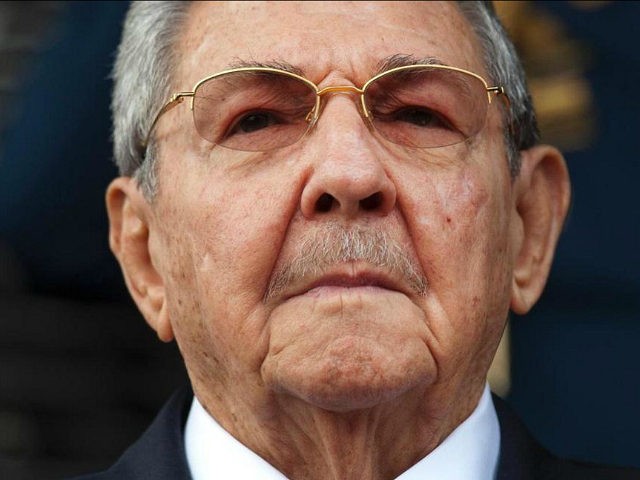Cuban dictator Raúl Castro has publicly condemned major policy initiatives in U.S. President Donald Trump’s agenda, including the “irrational” call to build a wall on the southern border and “extreme” and “selfish” trade policies that would benefit American workers.
“We are in a crucial era due to regional political regressions that will have a negative impact on all our peoples,” Castro said on Sunday, speaking before the Bolivarian Alliance for the Peoples of our Americas (ALBA), a leftist leadership summit organized by the authoritarian socialist government of Venezuela.
According to the Communist Party newspaper Granma, Castro urged leaders at the ALBA summit — which included prominent leftist autocrats such as Venezuelan dictator Nicolás Maduro, his Bolivian counterpart Evo Morales, and Nicaraguan leader Daniel Ortega — to remember that “Fidel [Castro] taught us to be realists and what is impossible can be achieved if we commit to it with firmness.”
“The new agenda of the U.S. government threatens to unleash an extreme and egotistical trade policy that will impact the competitiveness of our foreign trade; violate environmental agreements… hunt down and deport migrants,” Castro added, according to a Reuters translation. “You can’t contain poverty, catastrophe and migrants with walls, but with cooperation, understanding and peace.”
As the dictator of an island, Castro has not needed walls to trap his citizens in. Moving out of Cuba is nearly impossible without close connections to the Castro regime, leaving thousands to choose dangerous attempts to reach the United States by sea while the Cuban Coast Guard is not looking. Thousands have died in the attempt, while many others land outside the United States, in Mexico or Central America.
Mexico typically agrees to either repatriate Cubans fleeing communism who land on their soil or allow them to travel north to America. Thanks to President Barack Obama’s last-minute decision to rescind the “wet foot, dry foot” policy — which granted Cuban exiles automatic legal refugee status in the United States — Mexico has done more of the former recently, forcing dozens of Cubans to face the arbitrary communist legal system at home.
Some still stranded in Mexico are hoping that President Trump’s public desire to reform the nation’s immigration system to benefit pro-American refugees will help their cause. “A new president that wants to help the oppressed people of Cuba is our only hope,” one Cuban refugee in Nuevo Laredo told Breitbart News in January. “We have nothing and we can not go back; it was a very radical decision.”
The relationship between Mexico and Cuba suffered somewhat last month, however, when Havana refused to allow former president Felipe Calderón to enter the country, claiming it would be an “unacceptable” act of aggression for him to do so. Calderón had been invited to attend a ceremony organized by anti-communist Cuban dissidents. The Mexican government failed to stand up for Calderón, merely issuing a statement calling the situation “lamentable.”
The Cuban propaganda newspaper Granma continued Castro’s theme on Tuesday with attacks on President Trump’s new executive order on immigration, publicizing for the Cuban people leftist agitation on social media but failing to explain any details in the executive order. In contrast, Castro had chastised President Obama for not using executive orders to override Congress more often.
In addition to using his platform at the radical leftist conference to attack President Trump, Castro praised the failing government of Venezuela. “The decisive battle for sovereignty, emancipation, integration [globalization], and development in our Americas is being waged in Venezuela today,” he told the audience. “Venezuela has made great efforts to integrate the region with its solidarity and generosity towards the peoples of Latin America and, especially, the peoples of the Caribbean… we support the dignified, courageous, and constructive position of President Nicolás Maduro.”
President Trump has openly condemned the Cuban government, both as a candidate and as president. Following his death, Trump issued a statement condemning “brutal dictator” Fidel Castro and calling for a free Cuba. He has also overtly challenged the Venezuelan government, welcoming the wife of a Venezuelan political prisoner to the White House and calling for the release of all prisoners of conscience in that nation.

COMMENTS
Please let us know if you're having issues with commenting.